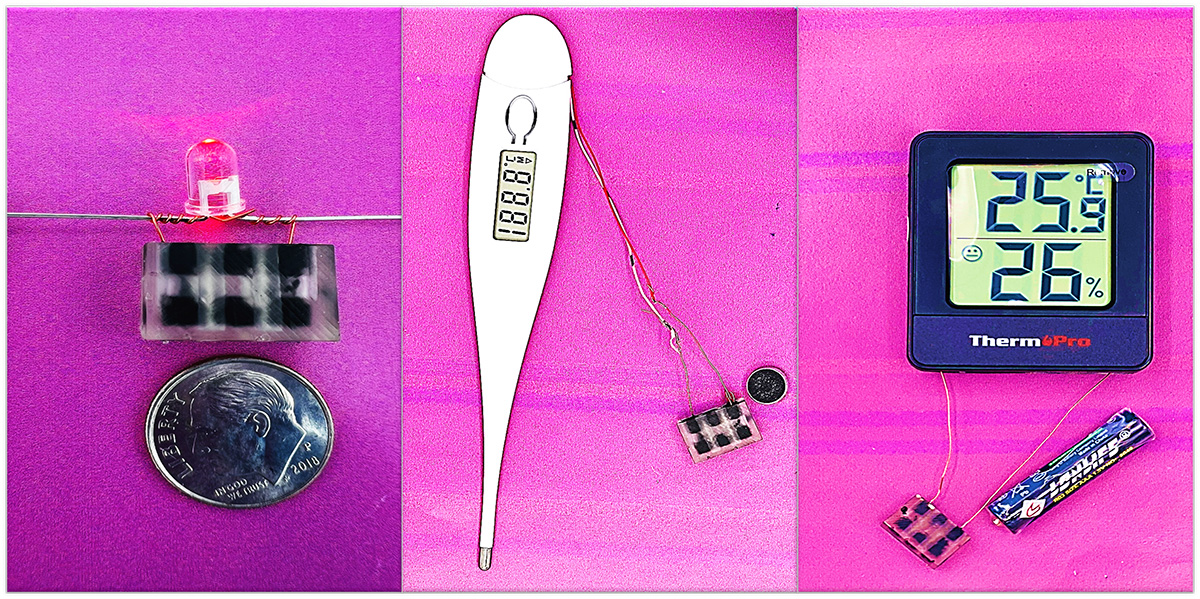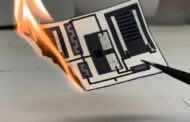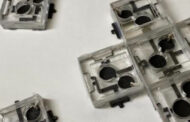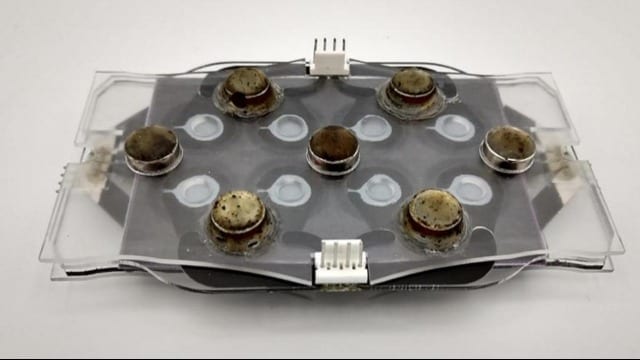
Professor Seokheun “Sean” Choi and PhD student Maryam Rezaie have created a small biobattery that works on bacteria and potentially has a 100-year shelf life.
Watson College Professor Seokheun “Sean” Choi aims to make fuel cells for portable, storable and on-demand power generation
Last fall, Professor Seokheun “Sean” Choi and his Bioelectronics and Microsystems Laboratory published their research into an ingestible biobattery activated by the Ph factor of the human intestine.
Now, he and PhD student Maryam Rezaie have taken what they learned and incorporated it into new ideas for use outside the body.
A new study in the journal Small, which covers nanotechnology, shares the results from using spore-forming bacteria similar to the previous ingestible version to create a device that potentially would still work after 100 years.
“The overall objective is to develop a microbial fuel cell that can be stored for a relatively long period without degradation of biocatalytic activity and also can be rapidly activated by absorbing moisture from the air,” said Choi, a faculty member in the Department of Electrical and Computer Engineering at the Thomas J. Watson College of Engineering and Applied Science.
“We wanted to make these biobatteries for portable, storable and on-demand power generation capabilities,” Choi said. “The problem is, how can we provide the long-term storage of bacteria until used? And if that is possible, then how would you provide on-demand battery activation for rapid and easy power generation? And how would you improve the power?”
The dime-sized fuel cell was sealed with a piece of Kapton tape, a material that can withstand temperatures from -500 to 750 degrees Fahrenheit. When the tape was removed and moisture allowed in, the bacteria mixed with a chemical germinant that encouraged the microbes to produce spores. The energy from that reaction produced enough to power an LED, a digital thermometer or a small clock.
Heat activation of the bacterial spores cut the time to full power from 1 hour to 20 minutes, and increasing the humidity led to higher electrical output. After a week of storage at room temperature, there was only a 2% drop in power generation.
The study is funded by the Office of Naval Research, and it’s easy to imagine the military applications for a power source that could be deployed on the battlefield or in remote locations. However, there would be plenty of civilian uses for such a fuel cell, too.
While these are all good results, Choi knows that a fuel cell like this needs to power up more quickly and produce more voltage to become a viable alternative to traditional batteries.
“I think this is a good start,” he said. “Hopefully, we can make a commercial product using these ideas.”
Original Article: Tiny biobattery with 100-year shelf life runs on bacteria
More from: Binghamton University
The Latest Updates from Bing News
Go deeper with Bing News on:
Microbial fuel cell
- Researchers seek to scale ‘yeast fuel’ production
Scientists at Thailand’s Chulalongkorn University say yeast and agricultural waste will play a key role in the development of renewable jet fuel for the aerospace industry ...
- What’s that?…A fuel cell that harvests energy from…dirt?
A soil microbial fuel cell where microbes in dirt could power applications which are literally “in the field”.
- Revolutionizing Clean Energy: SRMAP's Breakthrough in Fuel Cell Technology with LaFeO3 Perovskite
In the quest for sustainable energy solutions to meet the soaring global energy demands, an innovative breakthrough has emerged from the laboratories of SRM University-AP, situated in the picturesque ...
- Teen brothers teach Alberta students about microbial fuel cell technology
Aaron Tan, 16, is in Grade 11, at Calgary's Westmount Charter Mid-High School, while his brother Justin Tan, 15, is in Grade 9. It was just last year that the pair decided to share their love of ...
- How the Navy Is Fighting Climate Change With Action on Clean Energy
The U.S. military is the world's largest single source of climate pollution. Work at the Naval Research Laboratory offers greener fuel for sailors and Marines.
Go deeper with Bing News on:
Biobatteries
- Feed has no items.







